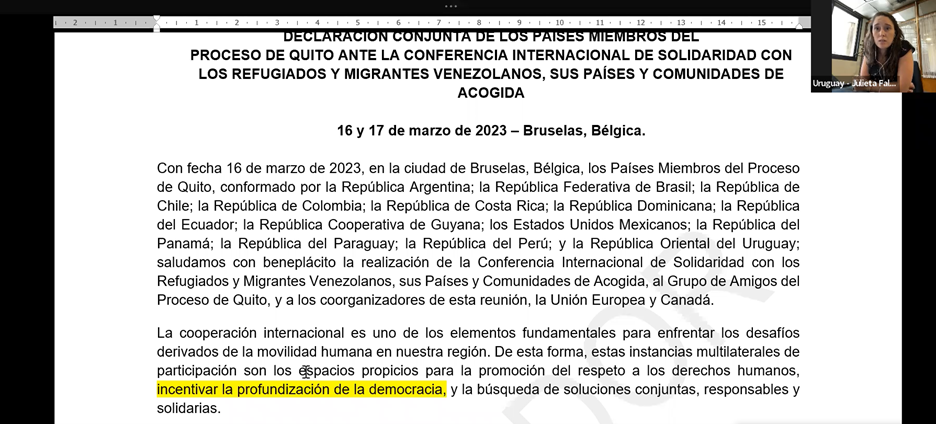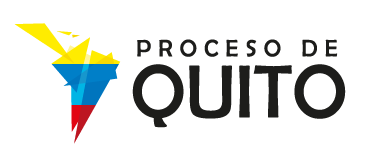Joint declaration of the Member States to the International Solidarity Conference
The document proposes moving towards a new migratory narrative in the region and to a sustainable integration strategy in host countries and communities, among others. Read the full text below.

Santiago de Chile, March 15. The Member States of the Quito Process worked together to present a joint Declaration to the International Conference in Solidarity with Venezuelan Refugees and Migrants and Their Host Countries and Communities, which takes place on March 16 and 17 in Brussels, Belgium.
The document presents, among others, the importance of international cooperation in the current context of the region; recalls how human mobility processes increases international dialogue and the development of public policies in favor of refugees and migrants; emphasizes the need for a new migratory story and renews the commitment of the member countries of the Quito Process to the search for solutions, regularization and integration.
Additionally, it stresses the importance of the First Regional Meeting on Local Governments and Host Communities, held in Santiago de Chile last March 1st and 2nd, with a massive participation of all member countries, local governments, civil society, academia, members of the Group of Friends and United Nations agencies, which helped to develop a roadmap designed to strengthen work at the regional level with host communities.
Read the Joint Declaration below:
JOINT DECLARATION OF THE MEMBER STATES OF THE QUITO PROCESS TO THE INTERNATIONAL CONFERENCE IN SOLIDARITY WITH VENEZUELAN REFUGEES AND MIGRANTS, AND THEIR HOST COUNTRIES AND COMMUNITIES
March 16 and 17, 2023 - Brussels, Kingdom of Belgium
On March 16, 2023, in the city of Brussels, Kingdom of Belgium, the Member States of the Quito Process — constituted by the Republic of Argentina, the Federative Republic of Brazil, the Republic of Chile, the Republic of Colombia, the Republic of Costa Rica, the Dominican Republic, the Republic of Ecuador, the Cooperative Republic of Guyana, the United Mexican States, the Republic of Panama, the Republic of Paraguay, the Republic of Peru, and the Oriental Republic of Uruguay — welcomed the International Conference in Solidarity with Venezuelan Refugees and Migrants, their Host Countries and Communities, the Group of Friends of the Quito Process, and the co-organizers of this meeting (the European Union and Canada).
International cooperation is one of the fundamental elements required to face the challenges posed by human mobility in our region. Multilateral participation instances, are favorable spaces for the promotion of the respect for human rights, democratic values, and the search for joint, responsible, and solidarity-based solutions.
In this sense, the processes of human mobility represent an opportunity to strengthen international dialogue, and with it, to develop public policies in favor of refugees and migrants, favoring their optimal development and integration in host communities.
We also recognize that the challenges posed by human mobility in the region are multiple, and that addressing them in a comprehensive manner requires a bilateral, regional and international commitment to cooperation and coordination, based on the principle of shared responsibility and respect for human rights, carrying out coordinated actions to fight transnational crimes, such as human trafficking and smuggling, as well as related situations that put the integrity and lives of refugees and migrants at risk.
Additionally, we emphasize the need to move towards a new migration narrative, one that manifests the benefits and opportunities that human mobility represents for our region, promoting social cohesion, combating xenophobia, addressing the needs of host communities, and strengthening bilateral, regional and international cooperation.
As an intergovernmental technical space, the Quito Process has focused on developing coordinated regional responses to the human mobility situation involving refugees and migrants; developing concrete actions with the objective of protecting their dignity and human rights; and promoting safe, orderly and regular mobility to strengthen regular pathways, expanding and facilitating migration regularization processes, so that refugees and migrants can exercise all the rights to which they are entitled in light of domestic laws and regulations, as well as commitments under international law.
Consequently, as Member States of the Quito Process, we renew our commitment before the international community to seek solutions to the mobility of refugees and migrants, which will promote the protection of their human rights and, in accordance with domestic law and commitments under international law, an adequate development of their own migratory projects through their full integration in host countries and communities.
To advance towards this objective, we recognize that responses must be born out of a participatory and intersectoral perspective, promoting the contribution of all actors involved in the development of holistic proposals, and incorporating a territorial, gender, best interests of the child and human rights-based approach, as well as recognizing the shared responsibility and differentiated capacities of each of the countries.
We reiterate our call to the international community to increase technical and financial aid efforts; to strengthen cooperation partnerships with all relevant actors — to maintain international visibility of the human mobility crisis affecting the Latin American region; and to contribute to efforts made by host countries as regards the humanitarian care and integration of refugee and migrant populations.
We appreciate the more than $2.35 billion pledged at the 2021 Donor Conference to support the response to the situation of refugees and migrants. While we note that most of these commitments were directed towards humanitarian interventions, and we recognize the importance of a coordinated and efficient humanitarian response, we must move towards a sustainable integration strategy in host countries and communities to fill existing gaps in technical and financial cooperation.
We strongly believe that, depending on the circumstances, local governments and host communities play a fundamental role in the attention of migratory flows arriving to the territories, understanding that, in many cases, they represent the first experience and approach of refugees and migrants with the State. Therefore, supporting and strengthening their capacities must be one of our priorities, and we emphasize that this issue is one of the focuses of this fourth version of the International Solidarity Conference.
Taking this context into account, as the Quito Process, we carried out the First Face-to-Face Meeting on Local Governments and Host Communities, which was held in Santiago, Chile, on March 1 and 2. This workshop was attended by representatives of all member countries, local governments, civil society, academia, the R4V Platform, UN agencies, and members of the Group of Friends, whom we thank once again for their commitment and collaboration throughout both days of work.
This workshop helped in guiding the coordination and exchange of specific lines of work for host communities and local governments, enhancing an intersectional and horizontal approach when searching for answers and concrete actions in areas such as: a) children and adolescents on the move; b) women and access to rights; c) socioeconomic integration; and d) a new migration narrative.
Likewise, the results and proposals obtained from this workshop will allow us to elaborate a roadmap to strengthen the work with host communities and local actors, as well as manifest a deep synergy with the Portfolio of Cooperation Projects for the Group of Friends of the Quito Process. The following must be highlighted:
- a) Design and implement a capacity development kit focused on children and adolescents on the move for front-line local government officials, to favor their protection and access to rights and services;
- b) Consider specific reception and first response services for girls, adolescents, and women (especially those in vulnerable situations), getting host communities involved;
- c) Define a strategy for communication, promotion, and dissemination of socioeconomic integration programs, promoting new narratives to impact the public opinion matrix on migration; and
- d) Training for the media and officials in charge of assisting refugees and migrants to facilitate the use of language and raise awareness about human mobility.
As a joint solution engine, multilateralism must prevail in the face of the challenges presented by the human mobility reality in our region, promoting the participation of all relevant actors, under a solidarity and shared-responsibility approach.
We are confident that the work we have done, and that we will continue to do this year, will allow us to move forward in a participatory and democratic manner to develop coordinated and effective actions to strengthen the Quito Process System, for which international cooperation and the Group of Friends play a fundamental role.
In appreciation for the opportunity and invitation to participate in this International Solidarity Conference, the Member States of the Quito Process call for action and the search for concrete solutions, deepening the mechanisms of financing and international cooperation in the region, articulating the migration and development agendas, and enhancing the synergy between the actors involved in managing and integrating refugees and migrants in our region.
BRUSSELS, MARCH 16, 2023
Download:
+Joint declaration.

